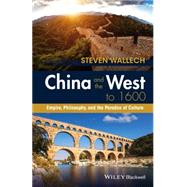A comparative history of Chinese and Western Civilization from the dawn of agriculture to the dawn of modernity in Europe, China and the West to 1600 explores the factors that led to the divergent evolution of two major cultures of the ancient world, and considers how the subsequent developments saw one culture cling to tradition even as the other failed to do so, inadvertently setting the stage for the birth of the Modern Era.
- An accessible and inventive comparative history, suitable for all students at the college level as well as general readers
- Compares the history of Chinese civilization with Western civilization from the rise of agriculture to the dawn of the modern period
- Explores the ways in which Western failures in the Middle Ages after the Roman Empire’s collapse, and China’s successes in the same period, laid the groundwork for each culture’s divergent path in the modern period
- Makes meaningful connections between cultures and over time, through the use of themes such as agriculture, philosophy, religion, and warfare and invasion
- Bridges the gap between antiquity and modernity, looking at many factors of the global Middle Ages that influenced the development of the modern world
- Features a timeline, maps, endnotes, and complete index








